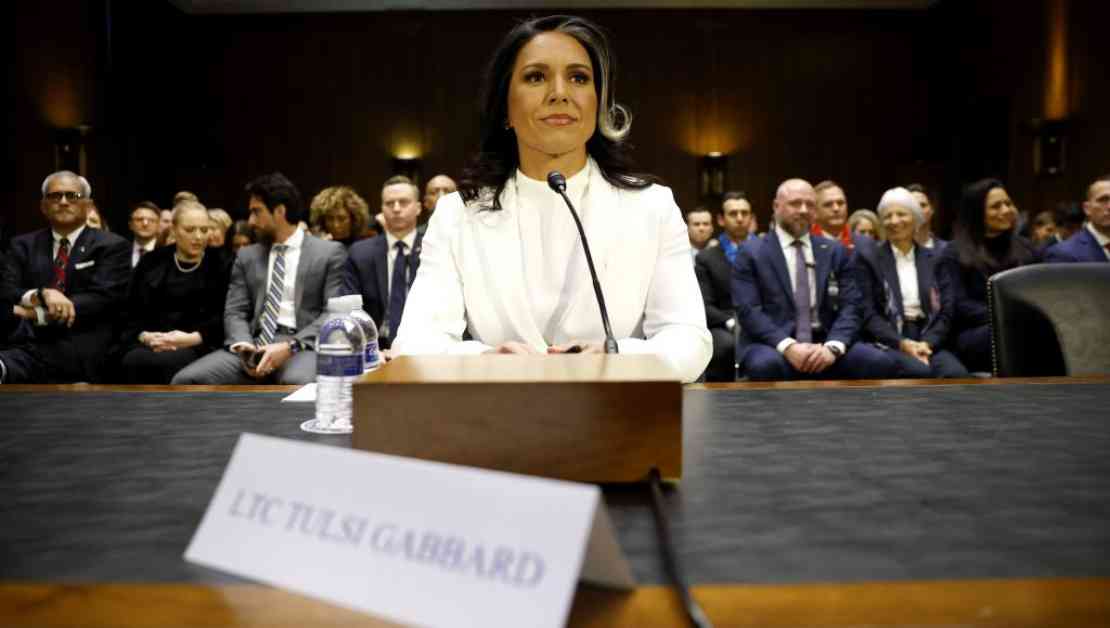Tulsi Gabbard’s Path to Confirmation: An Inside Look at the Director of National Intelligence Nomination Process
Former Democrat Tulsi Gabbard, who has recently aligned herself with President Donald Trump, finds herself at the center of a contentious confirmation process for the Director of National Intelligence position. Nominated by the President, Gabbard’s journey to assuming the role involves navigating Senate approval and addressing concerns raised during her confirmation hearing.
Gabbard’s departure from the Democratic Party in 2022 marked a significant shift in her political allegiance. In a video message posted online, she criticized the party for being controlled by what she described as an “elitist cabal of warmongers” who weaponize national security for political gain. This departure set the stage for her nomination by President Trump to serve as the nation’s top intelligence official.
As the potential Director of National Intelligence, Gabbard would be responsible for overseeing and coordinating the activities of various intelligence agencies, including the CIA, NSA, and FBI. This role entails ensuring the sharing of intelligence across agencies, supporting national security decision-making, and providing timely intelligence assessments to the President and senior officials. Additionally, the DNI manages the budget for intelligence agencies and serves as the President’s principal advisor on intelligence matters.
Gabbard’s confirmation hearing before the Senate Intelligence Committee on Jan. 30 was a pivotal moment in her nomination process. However, as of the latest update, she has not yet been confirmed for the position. During the hearing, concerns were raised by both Democrats and Republicans regarding her qualifications and stances on key issues.
Concerns and Controversies: Gabbard’s Confirmation Hearing
One of the primary concerns raised during Gabbard’s confirmation hearing was her stance on Edward Snowden, the former National Security Agency contractor who leaked classified information about U.S. surveillance programs. Republican senators pressed Gabbard to label Snowden as a “traitor” and acknowledge that his actions harmed national security. However, Gabbard’s responses to these questions did not fully satisfy her critics, leading to uncertainty about her approval for the position.
Gabbard’s refusal to categorize Snowden as a traitor highlights the complexities of her political beliefs and the challenges she may face in securing bipartisan support for her confirmation. As a nominee with close ties to President Trump, she must navigate a divided political landscape to gain the trust and approval of Senate members from both parties.
The Road Ahead: Gabbard’s Path to Confirmation
Moving forward, Gabbard’s confirmation process will continue to be closely monitored as she works to address concerns and secure the necessary votes for approval. The outcome of her confirmation will have far-reaching implications for the U.S. Intelligence Community and the nation’s approach to national security.
As Gabbard navigates the complexities of the confirmation process, her ability to engage with senators from both parties and address their concerns will be crucial. The Director of National Intelligence position requires a strong leader capable of balancing competing interests and making tough decisions in the interest of national security.
In the coming weeks, as the Senate deliberates on Gabbard’s nomination, the political landscape will be closely watched to see how her confirmation unfolds. The stakes are high, and the outcome will shape the future of U.S. intelligence operations and the nation’s security posture.





















